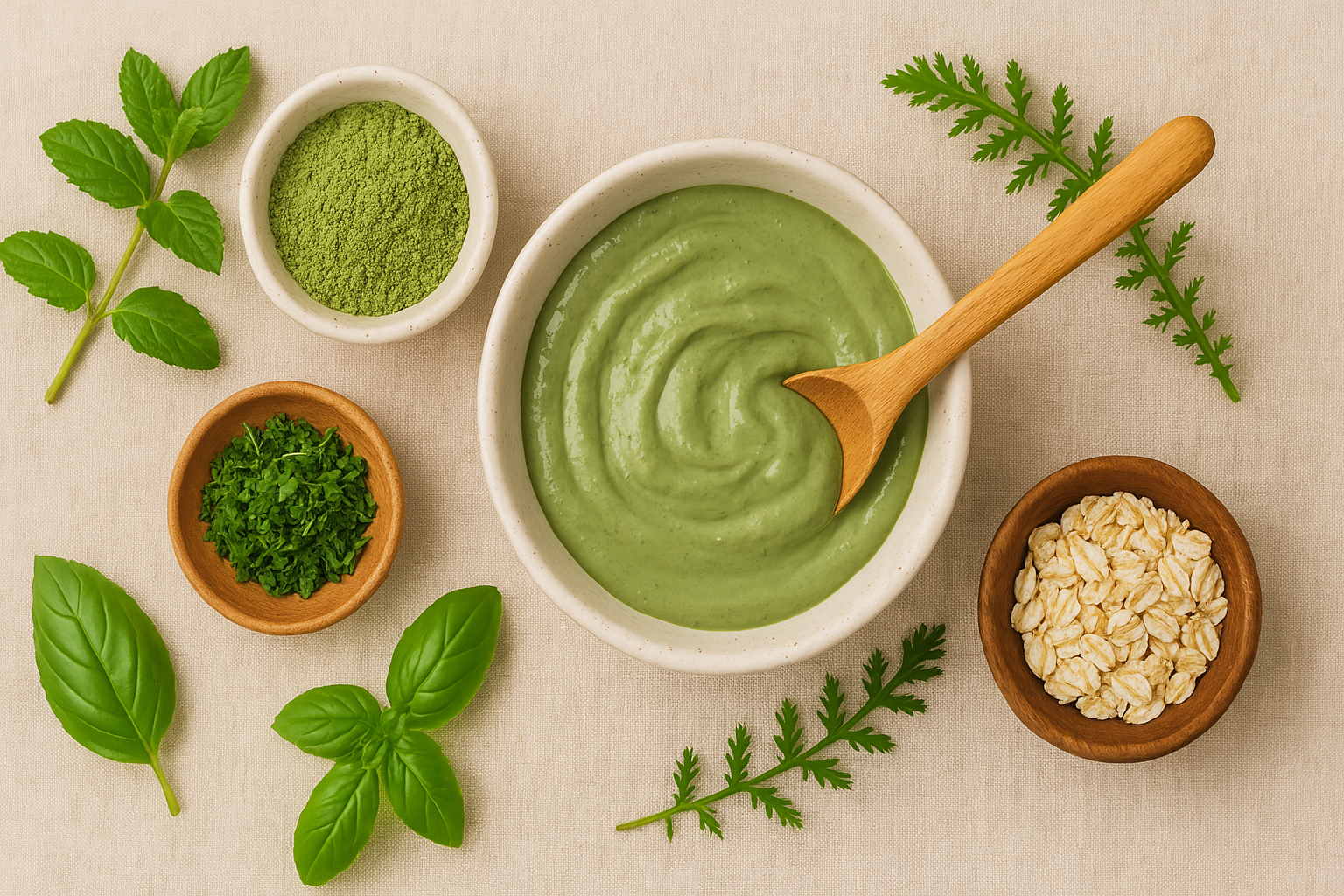Are you tired of store-bought face masks filled with chemicals? A DIY herbal face mask is a natural and effective way to nourish your skin while avoiding harmful additives. Whether you have oily, dry, sensitive, or acne-prone skin, using the right herbs can help you achieve a healthy and glowing complexion.
In this guide, we’ll explore the best herbal ingredients for different skin types and share easy-to-make DIY face mask recipes.
Understanding Different Skin Types
Before choosing a face mask, it’s important to understand your skin type:
- Oily Skin: Prone to excess sebum, leading to acne and clogged pores.
- Dry Skin: Lacks moisture, often resulting in flakiness and irritation.
- Combination Skin: A mix of oily and dry areas, usually with an oily T-zone.
- Sensitive Skin: Easily reacts to products, often showing redness or irritation.
- Acne-Prone Skin: Frequently develops pimples due to clogged pores and bacteria.
Each skin type has unique needs, and choosing the right herbal ingredients can make a significant difference.
Best Herbal Ingredients for Face Masks
Here are some of the most effective herbal ingredients and their benefits:
- Aloe Vera: Hydrates, soothes irritation, and reduces redness.
- Turmeric: Fights inflammation, brightens skin, and reduces acne scars.
- Neem: Has antibacterial properties that help clear acne.
- Oatmeal: Gently exfoliates and retains moisture.
- Honey: A natural humectant that locks in moisture and fights bacteria.
- Avocado: Rich in healthy fats, deeply nourishing for dry skin.
- Matcha Green Tea: Packed with antioxidants that fight aging and dullness.
DIY Herbal Face Mask Recipes
1. Oily Skin: Oil-Control Neem & Rose Mask
Ingredients:
- 1 tbsp Multani Mitti (Fuller’s Earth)
- ½ tsp neem powder
- 2 tbsp rose water
Instructions:
- Mix all ingredients into a smooth paste.
- Apply evenly and leave for 15 minutes.
- Rinse with cold water and pat dry.
Benefits: Absorbs excess oil, unclogs pores, and prevents acne breakouts.
2. Dry Skin: Hydrating Avocado & Honey Mask
Ingredients:
- ½ ripe avocado, mashed
- 1 tbsp honey
- 1 tbsp ground oatmeal
Instructions:
- Blend all ingredients until smooth.
- Apply generously and leave for 20 minutes.
- Rinse with lukewarm water.
Benefits: Deeply moisturizes, soothes irritation, and improves skin texture.
3. Combination Skin: Balancing Turmeric & Yogurt Mask
Ingredients:
- 1 tbsp plain yogurt
- ½ tsp turmeric powder
- 1 tsp honey
Instructions:
- Mix ingredients thoroughly.
- Apply to the face and leave for 15 minutes.
- Rinse with warm water.
Benefits: Balances oil production, hydrates, and brightens the skin.
4. Sensitive Skin: Calming Aloe & Chamomile Mask
Ingredients:
- 2 tbsp aloe vera gel
- 1 tbsp cucumber juice
- 1 tbsp cooled chamomile tea
Instructions:
- Combine ingredients to form a gel-like consistency.
- Apply and leave for 10–15 minutes.
- Rinse with cool water.
Benefits: Reduces redness, soothes irritation, and hydrates gently.
5. Acne-Prone Skin: Anti-Blemish Turmeric & Honey Mask
Ingredients:
- 1 tsp turmeric powder
- 1 tbsp honey
- 1 tbsp yogurt
Instructions:
- Mix into a paste and apply a thin layer.
- Let sit for 15 minutes, then rinse.
Benefits: Fights acne-causing bacteria, reduces inflammation, and evens skin tone.
How to Apply Face Masks for Best Results
- Cleanse your face before applying any mask to remove dirt and oil.
- Use a brush or clean hands to apply an even layer.
- Let the mask sit for the recommended time but avoid letting it dry out completely.
- Rinse with lukewarm or cold water and pat dry with a soft towel.
- Follow up with a moisturizer to lock in hydration.
Precautions and Tips
- Always do a patch test before using a new ingredient to check for allergies.
- Use fresh, organic ingredients for maximum benefits.
- Don’t overuse masks—1–2 times a week is ideal.
- Avoid harsh scrubbing when washing off masks, especially for sensitive skin.
Conclusion
DIY herbal face masks are a simple and effective way to take care of your skin naturally. By understanding your skin type and using the right herbal ingredients, you can achieve a radiant, healthy complexion without the need for harsh chemicals.
Try these recipes and customize them based on your skin’s needs. Consistency is key to glowing, beautiful skin!




